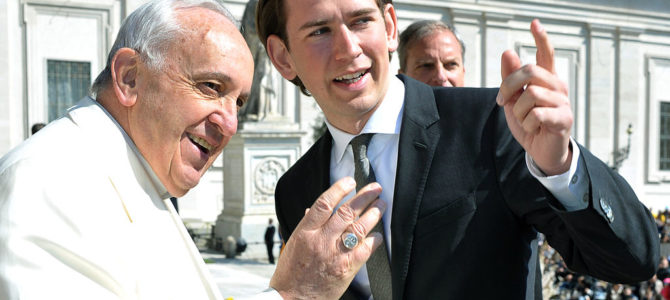
On Sunday, Austria became the latest European country to hold national elections amid a nationalist rival and a migrant crisis that is heading into its third year. The 31-year-old leader of the conservative People’s Party and the current foreign minister, Sebastian Kurz, will be Austria’s next chancellor.
Kurz’s party came in first place with 31.4 percent of the vote. The Social Democrats, who currently rule, had 26.7 percent, while the far-right Freedom Party surpassed the incumbent party with 27.4 percent of the vote. Kurz’s win marks the latest sign of Europe’s slow march away from the European Union and toward a renaissance, for better or for worse, of national sovereignty.
The major issues Kurz ran on throughout his campaign had to do, not surprisingly, with immigration. He wants to beef up the country’s borders and has proposed reducing government benefits to new migrants to Austria and making them available only after an individual has been in the country for five years, to lessen incentives to come to the country. Kurz also promised to lower the country’s current cap on the number of asylees it can take in (the young foreign minister introduced those caps last year, pushing back against the European Union’s open-door policy for migrants).
To Win, Kurtz Had to Move Right
Kurz has long been an European Union opponent unafraid to push back against what he sees as the dangers of Islam in Europe. As foreign minister, he called in 2015 for tighter control over the EU’s external borders. He also proposed a law that would limit the funding of mosques and imam’s salaries by foreign entities—something that could go a long way toward tamping down on radicalization of Muslim European youths—and regulate the version of the Quran that’s used in Austria. He was also instrumental in the “burqa ban” that recently went into effect and for helping close down the Balkan migrant route last year.
Austria has seen its fair share of migrants since the refugee crisis first began in 2015, and some of it has left Austrians with a bad taste in their mouths. For migrants headed to Germany, Austria was one of the major routes, but some migrants stayed. An essay earlier this year in the National Interest highlighted the consistent and ongoing sexual assaults and abuses of the welfare system by Afghan migrants in Austria. Voters in Sunday’s election no doubt had those trends in mind when they cast their ballots.
Kurz understood what was happening in Austrian politics and among the Austrian people enough to know that he had to make immigration his party’s primary focus if it was going to take power from the Social Democrats—and if he was going to avoid losing to the more staunchly anti-immigrant Freedom Party. Kurz seems to have held his policy opinions for at least the last couple of years, but his party hasn’t. To win, it had to take a big step to the right.
This isn’t the first time a European politician has had to push his or her policies to the right during this year’s glut of national elections across the continent. Mark Rutte, the prime minister of the Netherlands, did the exact same thing earlier this year. Faced with the prospect that far-right politician and outspoken critic of Islam Geert Wilders would take his place as prime minister, Rutte lurched right. Rutte made statements like “If you don’t like it here, you can leave,” and “Behave normally or leave,” in a bid to appeal to Wilders supporters.
The Rightward Swing Hasn’t Brought Fascism
Many people worried that this year would see a radical upheaval in European politics in which countries would vote into power far-right parties that would shut down immigration and drag their countries back toward Europe’s dark fascist past. There has been notable relief that that hasn’t happened. Marine Le Pen didn’t win the presidency in France. Angela Merkel is still the German chancellor. Yet there has also been a heavy dose of naïveté or simple willful denial of what’s happening.
Far-right parties in the Netherlands, Germany, and France, even if they didn’t win, have done far better in this year’s elections than they ever have before. Just so in Austria. The Freedom Party far outpaced its previous performances and defeated the sitting government’s party. Although the results are not as sexy as an outright win, it was unrealistic to think that change in Europe would be so dramatic.
However, with Kurz’s win and the rumors that he may form a coalition government with the far-right party, there’s reason to think Europe’s populist movement is picking up speed. Austria is a central European country that has been hit hard by the migrant crisis, much like its eastern European neighbors. Just like Poland and Hungary, it is pushing back against the social democratic narrative of a Europe without individual cultures and nationalities and borders. To varying degrees, these countries are rejecting the policies and priorities of the EU.
The upheaval in Europe is quieter and slower than panicked onlookers first thought it would be, but it’s happening all the same. Kurz’s victory in Austria is the latest and most pronounced evidence of that change. It appears that, at least for now, populism in Europe is here to stay.









